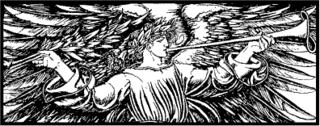Sons of God and Daughters of Men
 Billie Smith asked about Gen 6.1,2, the strange passage about "the sons of God" marrying "the daughters of men." Here's my response:
Billie Smith asked about Gen 6.1,2, the strange passage about "the sons of God" marrying "the daughters of men." Here's my response:Two interpretations have been set forward regarding the "sons of God" uniting with "the daughters of men" in this passage. One interpretation is that the "sons of God" refers to angelic beings as it does in Job 1.6; 2.1 and 38.7 (cf. Dan 3.25). The Pseudepigraphal book, 1Enoch, chapter 6 and following, assumes this interpretation as it describes the conspiracy of angels to mate with human women, and the horrible 300-cubit giants that were their offspring (see also 1Enoch 9.8; 15.3; 18.3 and 2Enoch 18). Irenaeus takes up this interpretation in his Proof of the Apostolic Preaching, describing how angels not only produced giants by mating with human women, but also taught the women all kinds of witchcraft and evil arts. Julius Africanus (b. AD 200) acknowledges a possible connection with magic arts, but opines that "the Spirit" means by "the sons of God" to indicate the righteous descendants of Seth (fragments, ch. 2). One of the Dead Sea Scrolls, the Genesis Apocryphon (1QapGen), in recounting the unusual birth of Noah, has Lamech describing his suspicion that the conception was due "to the Watchers and the Holy Ones…" Josephus is explicit in saying that "many angels of God accompanied with women, and begat sons that proved unjust, and despisers of all that was good, on account of the confidence they had in their own strength; for the tradition is, that these men did what resembled the acts of those whom the Greeks call giants" (Ant. 1.73), and Whiston in his notes says, "This notion, that the fallen angels were, in some sense the fathers of the old giants, was the constant opinion of antiquity." (Sources: Charlesworth; Smith; Vermes.)
The second interpretation of the "sons of God" and "daughters of men" passage is that the "sons of God" refers to the godly line of Seth, and the "daughters of men" refers to the ungodly line of Cain. It would follow that intermarriage between the two lines caused the moral decline that finally led to the deluge. This interpretation is plausible since humans also were referred to as "sons of God" (see Deu 32.4,5; Psa 82.6; Hos 1.10). Keil rightly observes that the biblical designation “sons of God” is not intended in a physical sense, since neither angels nor men are physically generated by God, nor born with His divine essence. Rather, the designation is a moral one, and thus cannot be restricted to either men or angels, but can indicate anyone who submits to God as a spiritual son. (Notice how Satan is distinguished from the "sons of God" in Job 1.6; this positive designation would not be applied to fallen or rebellious angels!) Keil also points out that contextually, no previous mention of angels as a category of beings occurs in the Genesis context, "not even [of] their creation." On the other hand, pious men who "began to call on the name of the LORD" are mentioned just before our "sons of God" passage at the end of the preceding section, Gen 4.26. Therefore, in spite of the accretion of legends about angels that attached to Gen 6 over time, the original audience of this passage, could only have understood it to have reference intermarriage between the godly line of Seth and the less pious descendants of Cain.
I have briefly entertained a third interpretation of this passage, namely the idea that disembodied spirits "possessed" ungodly men in order to consort with human women. However, the context of the passage gives no hint to prepare us for such a meaning; this would be a "retro-interpretation" dependent upon later legends and perspectives foreign to the Genesis text. Also, as mentioned above, "sons of God" is a favorable designation and would not be applied to angels who "left their proper habitation" (Jud 1.6). Furthermore, the phrase "took wives" in Gen 6.2 is the standard Heb phrase for marriage, therefore, the "sons of God" actually married women, they did not simply fornicate with them nor "possess" men who did. The statement of Christ that angels do not marry, while not explicitly denying sexuality to angels, does strongly imply that they are incapable of marriage by design (Matthew 22.30). Since there is no support whatsoever in Scripture for the idea that angels or spirits are capable of marriage with humans, we must abandon such an interpretation for Gen 6.1,2.
 Anthem OT/NT @ Living Water
Anthem OT/NT @ Living Water


0 Comments:
Post a Comment
<< Home